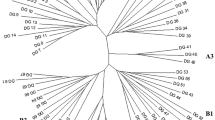Abstract
Tissue culture-derived plants of oil palm (Elaeis guineensis Jacq.) can develop abnormal flowers in which stamen primordia are converted into carpel-like tissues (mantled fruit). This abnormality can be heritable; individual palms may show variation in mantling and reversion to the normal phenotype over time has been observed. Four sets of ortets (mother plant used as tissue source) and ramets (regenerated plants) were compared using standard amplified fragment length polymorphism (AFLP) analysis and AFLPs using methylation-sensitive enzymes. No polymorphisms were found when standard AFLPs were produced with ten different primer combinations. In contrast, when methylation-sensitive AFLPs were used, polymorphisms were detectable. Polymorphisms appeared as new bands in the ramets, suggesting that a reduction in methylation had occurred during tissue culture. The highest number of polymorphic bands (0.3%) was obtained when HpaII was used as the restriction endonuclease, indicating that the loss of methylation had occurred most frequently at the internal C within the HpaII recognition sequence 5’-CCGG-3’. Conversion of nine of the polymorphic bands into probes for Southern analysis confirmed that these were not due to partial digestion of the AFLP templates and showed that the majority were single-copy sequences. The exceptions were fragments showing homology to 25S ribosomal RNA genes and the chalcone synthase gene family. Examination of the Southern blots suggested that most of the single-copy sequences were partially de-methylated, and one example was found in which de-methylation affected only one allele. No polymorphism was consistently different between normal and abnormal clones in all the sets. This suggests that, whilst this method is an effective way of detecting variation in tissue culture-derived plants, different approaches will be required to identify the causal basis of the mantled fruit abnormality.
Similar content being viewed by others
Author information
Authors and Affiliations
Additional information
Received: 25 May 2000 / Accepted: 28 August 2000
Rights and permissions
About this article
Cite this article
Matthes, M., Singh, R., Cheah, SC. et al. Variation in oil palm (Elaeis guineensis Jacq.) tissue culture-derived regenerants revealed by AFLPs with methylation-sensitive enzymes. Theor Appl Genet 102, 971–979 (2001). https://doi.org/10.1007/s001220000491
Issue Date:
DOI: https://doi.org/10.1007/s001220000491




